
That Moment You Became the Character
Have you ever found yourself fully immersed in a world that wasn’t your own, yet felt so familiar? The sensation of stepping into the shoes of another character, experiencing their emotions, struggles, and triumphs, is a profound aspect of storytelling that transcends mediums, be it literature, film, or video games. This phenomenon, often referred to as “character immersion,” can be a transformative experience for audiences, captivating our hearts and minds in ways that linger long after the story concludes. Let’s explore this concept in depth, examining how and why we sometimes feel as if we have truly become the character, and the impact such experiences have on our lives.
The roots of character immersion lie in the connection that we form with the narrative and its protagonists. When we engage with a story, our brains begin to mirror the experiences of the characters, a phenomenon supported by the concept of mirror neurons. These neurons allow us to empathize with others, igniting a response within us that feels deeply personal. We don’t just observe a character’s journey; we participate in it emotionally. Whether it’s the heart-wrenching sacrifice of a hero, the struggles of an anti-hero, or the growth of an underdog, we find ourselves voicing their hopes and fears as if they were our own.
One of the critical factors that contribute to such deep immersion is the quality of the storytelling. Well-crafted narratives resonate with audiences by weaving together relatable themes, complex characters, and intricate plots. An engaging narrative draws us in, allowing us to forget our surroundings and immerse ourselves in another reality. For instance, in literature, a novel could beautifully articulate the intricacies of human relationships, enabling readers to resonate with the character’s plight. Similarly, in films or games, visual storytelling can amplify these emotions, pulling us into the protagonist’s world through breathtaking visuals and compelling soundscapes.
Moreover, there’s an element of escapism inherent in character immersion. Life can often be overwhelming, filled with responsibilities, pressures, and stress. When we escape into a character’s world, we are afforded a momentary reprieve from our realities. We can vicariously experience adventures, love, and even loss without facing the actual consequences. This escapism provides a healthy outlet for our emotions, enabling us to process our feelings indirectly through the characters we connect with. For many, becoming the character is akin to donning a mask; it allows us to explore sides of ourselves that we may not feel comfortable expressing in our own lives.
The video game industry, in particular, has excelled in facilitating character immersion. The interactivity of gaming allows players to make choices that influence the story’s outcome, heightening the connection to the character’s journey. By placing players in the driver’s seat, games like “The Last of Us,” “Life is Strange,” or “Skyrim” give us the opportunity to shape our narrative. We become the decision-makers, and with each choice, we forge a personal bond with our character that feels authentic and significant. The dilemma faced by a character in a game can evoke real emotions in players, leading them to feel the weight of their decisions profoundly.
Another significant aspect to consider is the role of relatability. Characters often embody struggles that mirror our own lives—be it societal issues, personal dilemmas, or universal fears. When we see our own struggles reflected in a character, it can lead to feelings of validation and connection. This resonance can be particularly powerful in stories that address themes of identity, anxiety, love, or loss—issues that many of us grapple with daily. For example, stories that explore mental health often strike a chord with those facing similar challenges, reinforcing the narrative of not being alone in one’s struggles.
Additionally, the implications of character immersion extend beyond mere enjoyment. Engaging with characters and their arcs can inspire personal growth and self-reflection. When we witness a character overcoming obstacles, overcoming fears, or achieving their dreams, it can ignite a spark within us to pursue our aspirations or confront our challenges. We internalize their journeys and, in doing so, may even feel motivated to enact change in our own lives.
In educational contexts, character immersion is also utilized as a transformative tool. Through reading, role-playing, or interactive simulations, learners can embody different perspectives, enhancing empathy and understanding. Literature discussions often encourage students to analyze characters’ motivations and decisions, promoting critical thinking and emotional intelligence. By becoming the character, students can navigate complex themes and topics, leading to a deeper comprehension of the material.
The phenomenon of becoming a character serves not just as an enjoyable pastime but as a vital part of the human experience. Through stories, we explore the depths of the human condition, fostering empathy and understanding between ourselves and others. This connection encourages us to reflect upon our values, beliefs, and aspirations, guiding us in shaping our identities.
As we conclude this exploration of character immersion, it’s essential to recognize the power stories have in binding us together. We may come from diverse backgrounds and experiences, yet through shared narratives, we find common ground. While we may leave behind the fictional escapades of our beloved characters, the lessons, emotions, and reflections gleaned from our time spent with them remain.
So the next time you find yourself lost in a story, remember the profound impact it has on your heart and mind. Embrace the moment you become the character, for in doing so, you’re not just escaping; you’re engaging in a journey of self-discovery, growth, and connection that echoes long after the story concludes. This experience could very well change how you view not just the characters in a story but the world around you, illuminating pathways to empathy, understanding, and ultimately, personal transformation.


